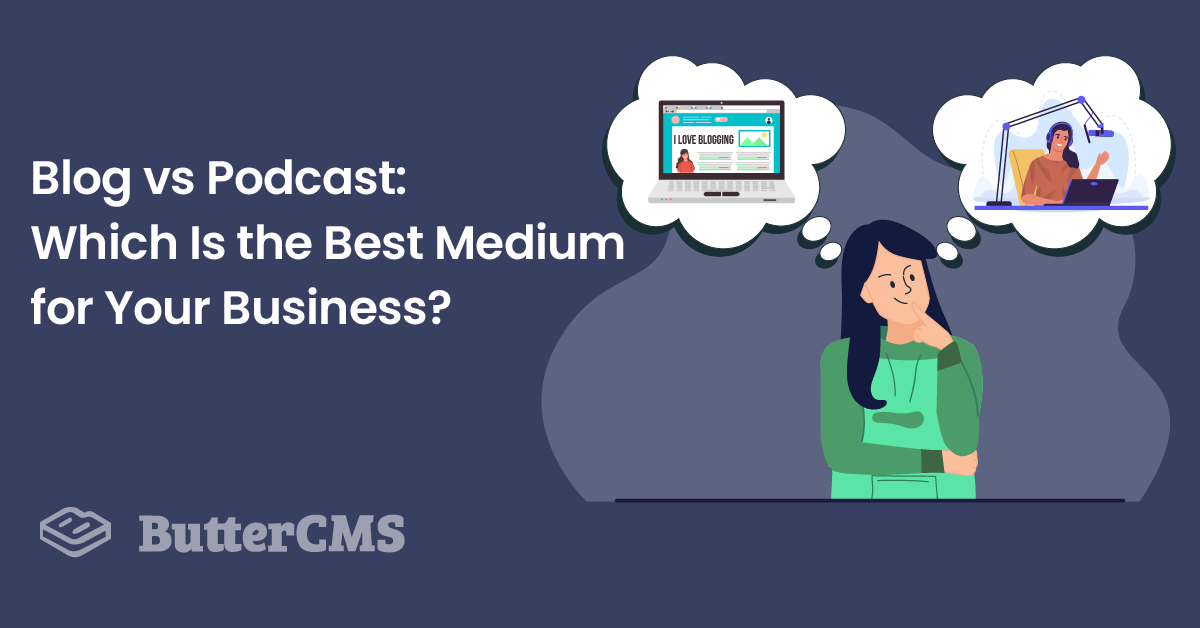
GSD
Blog vs Podcast: Which Is the Best Medium for Your Business?
Posted by Deb Mukherjee on October 11, 2023
If you’re creating a marketing strategy in 2022, chances are that blogging or podcasting will be a part of it. Why?
Well, there are over 600 million active blogs in the world, and companies with blogs produce an average of 67% more leads monthly than companies that don't blog.
As for podcasting, 55% (155 million) of the US population have listened to a podcast. To indicate how much businesses value podcasts, podcast ad spending will exceed $2 billion by 2023.
Suffice to say, both blogging and podcasting are phenomenal channels that marketers should leverage for their businesses. But this begs the question: which one should you focus on – blogging or podcasting?
Table of contents
Blogging & Podcasting for Businesses
Before we dive into the nitty-gritty of blogging and podcasting, you need to understand what they mean for B2B businesses. It’s different from just writing about your favorite cafe or journaling your European backpacking story.
Businesses rely on these mediums to generate leads, nurture them, bring in revenue, and eventually delight their customers.
What is blogging for business?
When you write an article, you’re essentially delivering value to your target audience by helping them with a problem in their lives. Agree? B2B blogging is no different. It’s the art of creating content that solves your customer’s problem.
Now, here’s the catch. If the customer genuinely likes and puts their faith in the content you’re putting out, they will sign-up for your newsletter or in some cases purchase the product itself. This is one way that you can track your ROI from blogging.
For example, Intercom is a company that has leveraged content creation well. Their core focuses are on support, marketing, and sales. But since 8 out of 10 startups look up to them (anecdotally speaking), they started writing about startups, products, design, and engineering. In short, it’s a content powerhouse.
Want more proof? According to SimilarWeb, Intercom’s website receives ~5 million visitors every month.
What is podcasting for business?
Moving on, podcasting started in 2004 and has since become a favorite for many marketers. Why? Here are a few reasons I can think of:
- Podcasts are more personal. You directly connect with the audience. It puts a human element to your brand.
- Most business podcasts are conducted in the form of interviews where someone from the company hosts an industry expert who shares their views and advice on crucial problems. This is almost like a 1:1 consultation with that expert; something that could be otherwise expensive.
- On the other hand, you can advertise on a popular podcast to reach your audience. The interested listeners can then check out your brand, see if it fits their requirements, and sign-up for a trial/demo – to put it simply, it’s the ROI of advertising on a podcast.
CoSchedule runs a podcast called Actionable Marketing Podcast, where they interview marketing thought leaders and talk about various challenges, opportunities, secret tactics, and more.
Why am I endorsing this? Well…
- I listened to it and it’s awesome!
- According to Chartable, they boast a rating of 4.9 with 144 reviews. Now, that’s good podcasting.
Now that you are aware of what business blogging and podcasting entails, it’s time for the brass tacks. At the end of the day, you have to decide – blog vs podcast? To make it easier for you, in the next section we'll cover the pros & cons of blogging and podcasting.
Blogging: Benefits & Challenges
Blogging is the go-to strategy for any B2B business these days. Every business, from the local ice cream vendor to publicly listed SaaS giants like Gusto, runs a blog. But is that the right strategy for you? Let’s find out.
Photo by Joanna Kosinska on Unsplash
Benefits of blogging
- Easily rank on Search Engines: Blogs are great for SEO, i.e., to rank on search engines like Google. If you target the right keywords, match the search intent, optimize your on-page SEO and get a few backlinks, the articles you write will start to rank. This will help drive traffic to your site that you can then convert into leads.
- Low barrier of entry: Typically, setting up a blog is quite easy. According to ThemeIsle, it takes less than 15 minutes to set up a blog on WordPress. If you go with Medium, it takes less than 2 minutes (yes, I made one before). And if you want a future-proof solution such as a headless CMS then ButterCMS can get you running in no time.
- Blog articles can generate new customers: Content can enable you to generate new customers every month like clockwork. For example, DelightChat wrote an article comparing itself to its biggest competitor, Gorgias. Now, this is an ideal example – customers see the benefits of DelightChat and if it’s a good fit, they will sign-up right away.
- Blogging can support all stages of the funnel: To recap, the stages of the funnel are: Attract, Consider, Decide, and Delight. You can write articles to support every stage of the funnel. For example, consider a newly launched email marketing software program. What could they write about across the stages?
- Attract: Is email marketing right for your business? 5 reasons why it probably is.
- Consider: EmailX Vs MailChimp: Why EmailX is better
- Decide: An extensive guide to using EmailX productively for your SaaS business
- Delight: How to set up a newsletter on EmailX in under 5 minutes
- You can make the articles interactive: Unlike podcasts, you can add rich media to your articles. Paste an image, add an infographic, embed a YouTube video – you can do it all. This also helps reduce the cognitive load of the reader as they don’t have to stare at endless walls of text.
Challenges in blogging
- Competition is super high: Throw a stone at any B2B company, and chances are they already have a blog. If they are any good, they'll probably have several articles ranking on the first page of Google. As a new business, it’s extremely challenging to start a blog and see returns in the short term.
- Writing valuable content is tough: There’s already a ton of valuable content out there for any given niche. To capture your reader’s attention (which is already low), you need to go above and beyond to produce a valuable article. But that’s not all, you need to be consistent at delivering the same value over and over again. This is no easy feat.
- You need a lot of bandwidth: Managing a blog isn’t easy. You need a team to manage it:
- An army of writers to produce valuable content regularly
- A designer to create custom graphics for your blog as per the brand guidelines
- A developer to manage the tech side of things
More often than not, the dev is a borrowed resource from the engineering team who might have higher priority items to finish (and blogging isn’t one of them). You could run it on WordPress but many are wary of its security infrastructure. However, a headless CMS could be a viable alternative to it.
Podcasting: Benefits & Challenges
Podcasting is what the cool kids are checking out these days. It’s becoming more and more common for folks to start a podcast, listen to a podcast, or sponsor one (in the case of a business). If a $137b company like Shopify is running a podcast, you know it works.
Photo by Soundtrap on Unsplash
Benefits of podcasting
- Podcasts deliver a human touch: Podcasting is an excellent choice for brand awareness. It creates an intimate connection with your audience by giving them a sense of your brand’s personality. Animalz, a premium content marketing agency, talks about successful content marketing strategies, debunks industry myths, and interviews experts from time to time on their podcast. Their personality is being actionable while keeping it fun and they excel at it through the podcast.
- Reach the young audience easily: If your company is targeting the young audience, then you’d benefit from advertising on a podcast or starting one. Why? Because according to Edison Research, ~74% of the podcast consumers are aged between 18 and 35.
- Interview experts: On podcasts, you can interview subject matter experts and get their take on problems your audience might face. This builds trust and credibility, thus turning you into a reliable industry resource. That’s not all, you can split the good parts of the podcast and repurpose them into social media posts easily.
- It helps with a low attention span: You need to devote 100% of your attention when reading an article. But the same isn’t true for podcasts. You can keep a podcast episode running on your headphones while you do something else like walking, driving home from work, cleaning dishes, etc. The bottom line? You can multitask while listening to an episode.
- Session time is higher: After someone clicks on a blog post, they won’t spend more than 37 seconds to read it. This significantly reduces your session time which can affect the search rankings. But that doesn’t exist for a podcast. On podcasts, if you find the content valuable, you will listen through the end. Best part? These episodes can be anywhere between 20 mins to 3 hours long.
Challenges of podcasting
- The set-up can be intimidating: Starting a podcast isn’t a piece of cake – the tech involved in the set-up and running a successful podcast can be an arduous task. At the bare minimum you'll need:
- A microphone to record clear audio
- A good pair of headphones to listen to what the guest/co-host is saying
- Audio editing software like Audacity or Adobe Audition
- A conference call program like Zoom or Zencastr to record the podcast
If you want to take it up a notch, a podcast website is also a good option. You may need help from the dev team which might be a whole new hassle considering that their priorities might be different. You could consider a Headless CMS with features that make it effortless to start a podcast.
- It’s a cumbersome process: There’s a lot to do when producing a podcast episode. You need to record the episode, edit the audio, write the description, upload it to your podcast hosting platform, and finally distribute it through different channels. It’s a decent amount of work that can take a few hours to complete.
- No direct call-to-action: There’s no direct CTA in a podcast. Of course, you can talk about your product, but a listener needs to open a browser tab, type in your brand’s name/URL, and fill out a form. As you can see, there’s friction in going through these steps, unlike a blog post where you simply click a button within the post to sign-up.
Playing to your strengths
To tell you the truth, there’s no one-size-fits-all answer to the question of whether you should start a blog or podcast for your business. However, both these mediums do complement each other. You can promote an awesome article on a podcast episode and vice versa. Although Google has since added playable podcasts to search, there’s still a long way to go for SEO podcasting.
Needless to say, your marketing plan shouldn't start with what medium you're going to use but with a clearly defined target audience and buyer persona. Is your buyer persona an audiophile or a more visual person? If they're the former a podcast might be the best option. Do they like reading more? Start a blog.
Oh, they love both? Great! Start a podcast along with a blog (if you have the team to execute it). Whatever the case may be, you can use ButterCMS to host either a podcast or a blog – it is platform-agnostic, secure, and allows your marketing team to control content for both channels (blog & podcast) from a single dashboard.
At the end of the day, if you’re creating content that’s valuable and easy to consume for your buyer persona, it doesn’t matter where or how you create it. It will always drive results.
Do you want your product or marketing team to test Butter CMS? We can set up a live demo to walk your team through the fast, easy-to-use interface.
ButterCMS is the #1 rated Headless CMS
Related articles
Don’t miss a single post
Get our latest articles, stay updated!
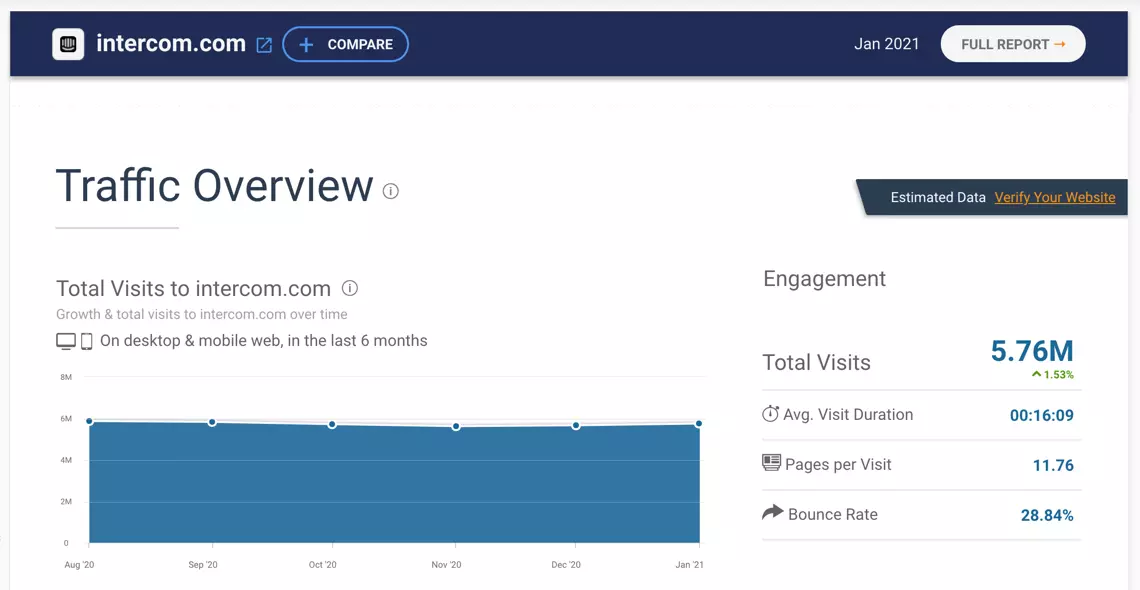
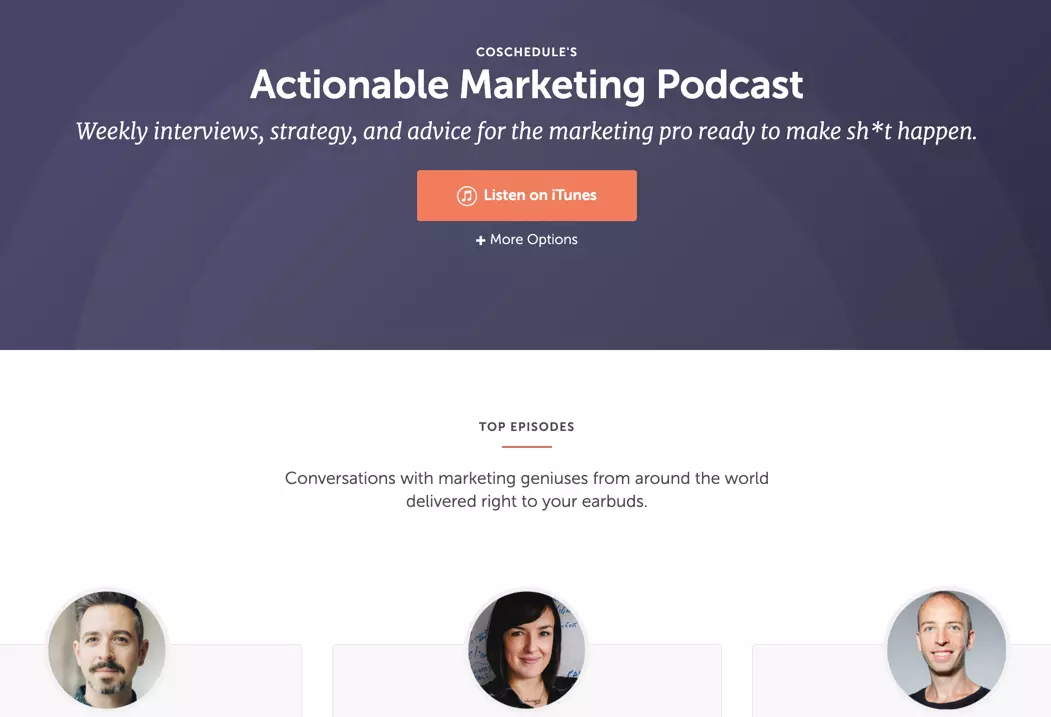


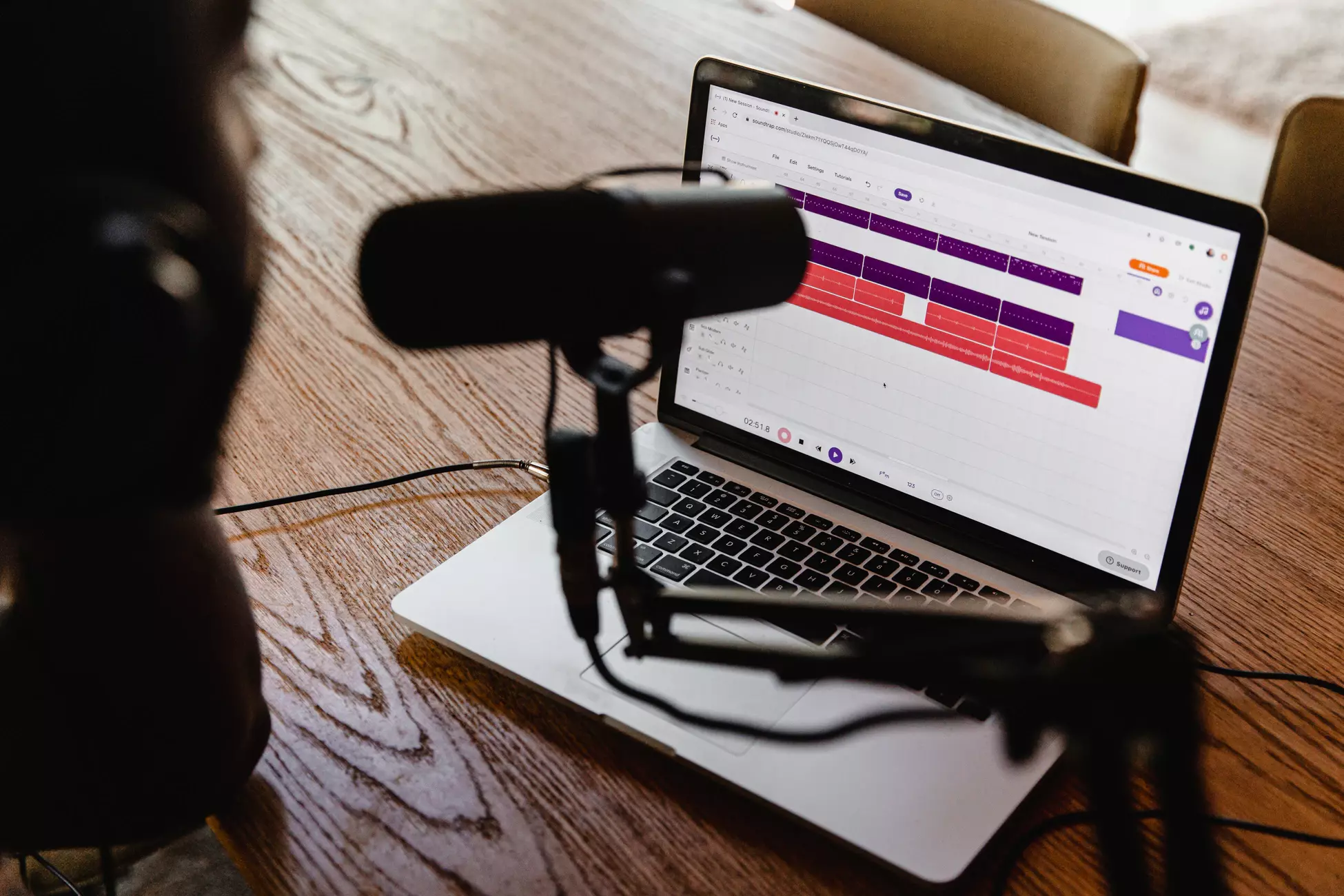

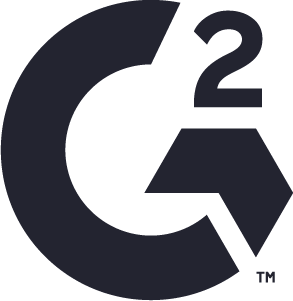











I'm Deb, a strategic content & organic growth marketer with close to 6 years of experience working with SaaS companies across the globe.